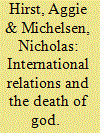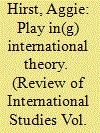|
|
|
Sort Order |
|
|
|
Items / Page
|
|
|
|
|
|
|
| Srl | Item |
| 1 |
ID:
124628


|
|
|
|
|
| Publication |
2013.
|
| Summary/Abstract |
Friedrich Nietzsche's proclamation of the 'Death of God' has come to function as something akin to a heuristic device in International Relations (IR) signifying the shattering of metaphysical and ontological certainty in European (post)modernity. According to Chris Brown, Nietzsche's declaration is commonly believed to signify a 'crisis in thought' which constitutes a 'genuine danger' insofar as it risks 'the collapse of the foundations of the old world order'.1 Roland Bleiker notes that such a crisis is deemed by many to be symptomatic of the loss 'of a generally accepted worldview that provided a stable ground from which it was possible to assess nature, knowledge, common values, truth, politics - in short, life itself'.2 This forum seeks to interrogate the substance and consequences of the claim that 'God is Dead' in the context of global politics, and specifically its implications for IR theory, contemporary political violence, and questions of ethics and responsibility.3 Before providing an overview of the points of synergy, agonism and divergence in the papers, this introduction will offer some contextualising remarks relating to the metaphysical, conceptual and historical parameters of the 'Death of God', marking its emergence in European political thought and provisionally mapping the terrain of its pertinence to contemporary IR.
|
|
|
|
|
|
|
|
|
|
|
|
|
|
|
|
| 2 |
ID:
117028


|
|
|
|
|
| Publication |
2012.
|
| Summary/Abstract |
This article argues that an engagement with the political philosophy of Leo Strauss is of considerable value in International Relations (IR), in relation to the study of both recent US foreign policy and contemporary IR theory. The question of Straussian activities within and close to the foreign policy-making establishment in the United States during the period leading up to the 2003 invasion of Iraq has been the focus of significant scholarly and popular attention in recent years. This article makes the case that several individuals influenced by Strauss exercised considerable influence in the fields of intelligence production, the media and think tanks, and traces the ways in which elements of Strauss' thought are discernible in their interventions in these spheres. It further argues that Strauss' political philosophy is of broader significance for IR insofar as it can be read as a securitising response to the dangers he associated with the foundationlessness of the modern condition. The article demonstrates that the politics of this response are of crucial importance for contemporary debates between traditional and critical IR theorists.
|
|
|
|
|
|
|
|
|
|
|
|
|
|
|
|
| 3 |
ID:
168881


|
|
|
|
|
| Summary/Abstract |
While the study of games and gaming has increased in International Relations in recent years, a corresponding exploration of play has yet to be developed in the field. While play features in several key areas – including game theory, videogames and popular culture, and pedagogical role-plays and simulations – little work has been done to analyse its presence in, and potentials for, the discipline. The aim of this article is to introduce the study of play to IR. It does this by demonstrating that play is political, and that it is at work across the global arena. Drawing on the deconstructive tradition associated with Jacques Derrida, its core contribution is a theorisation of play. The central argument developed is that play is (auto)deconstructive. By this I mean (1) that play precipitates an unravelling of any attempt at its conceptualisation, and (2) that this illustrates the value of a deconstructive approach to international theory. This claim is substantiated through an analysis of four key binary oppositions derived from Johan Huizinga's Homo Ludens. Having shown how play powerfully deconstructs its own conceptual foundations, I argue that a playful approach offers a robust challenge to entrenched assumptions in international theory.
|
|
|
|
|
|
|
|
|
|
|
|
|
|
|
|
| 4 |
ID:
124623


|
|
|
|
|
| Publication |
2013.
|
| Summary/Abstract |
Nietzsche's heralding of the 'Death of God' announces and exposes the condition of foundationlessness underpinning (Western) modernity and provokes the crucial question of the goals and purposes of political life. Without the figure of the divine as sanction and guide, political society lacks a stable foundation upon which to identify and legitimate itself. This paper explores the respective responses of two traditions of critical thought which engage explicitly with the challenges this poses, namely the messianic and the tragic. The central aim is to trace a series of 'traps' in evidence in both messianic and tragic thought which lead them to (re)turn to particular forms of transcendentalism; both traditions, it is argued, turn towards the divine in their responses to the 'Death of God'. However, the paper suggests that while the messianic is inextricably bound up in such a return to the divine, the tragic, as well as comprising several problematic violences, retains a particular salience in theorising subjectivity and the political under the condition of foundationlessness named by the 'Death of God'.
|
|
|
|
|
|
|
|
|
|
|
|
|
|
|
|
|
|
|
|
|